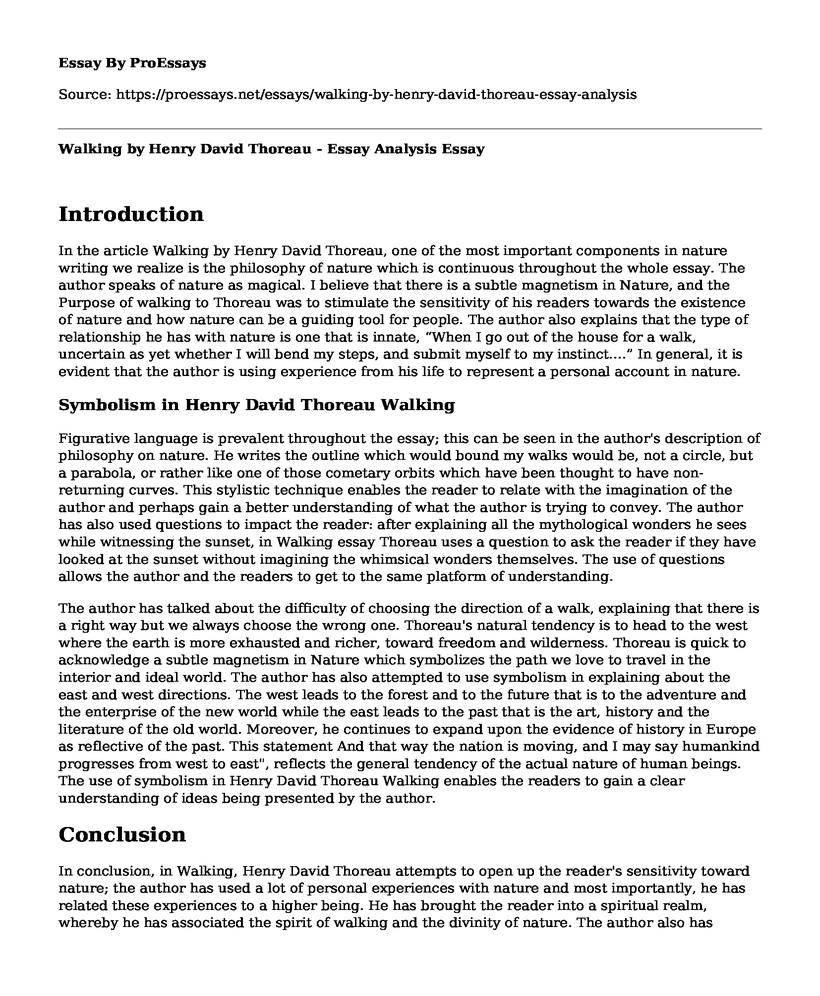Introduction
In the article Walking by Henry David Thoreau, one of the most important components in nature writing we realize is the philosophy of nature which is continuous throughout the whole essay. The author speaks of nature as magical. I believe that there is a subtle magnetism in Nature, and the Purpose of walking to Thoreau was to stimulate the sensitivity of his readers towards the existence of nature and how nature can be a guiding tool for people. The author also explains that the type of relationship he has with nature is one that is innate, “When I go out of the house for a walk, uncertain as yet whether I will bend my steps, and submit myself to my instinct....” In general, it is evident that the author is using experience from his life to represent a personal account in nature.
Symbolism in Henry David Thoreau Walking
Figurative language is prevalent throughout the essay; this can be seen in the author's description of philosophy on nature. He writes the outline which would bound my walks would be, not a circle, but a parabola, or rather like one of those cometary orbits which have been thought to have non-returning curves. This stylistic technique enables the reader to relate with the imagination of the author and perhaps gain a better understanding of what the author is trying to convey. The author has also used questions to impact the reader: after explaining all the mythological wonders he sees while witnessing the sunset, in Walking essay Thoreau uses a question to ask the reader if they have looked at the sunset without imagining the whimsical wonders themselves. The use of questions allows the author and the readers to get to the same platform of understanding.
The author has talked about the difficulty of choosing the direction of a walk, explaining that there is a right way but we always choose the wrong one. Thoreau's natural tendency is to head to the west where the earth is more exhausted and richer, toward freedom and wilderness. Thoreau is quick to acknowledge a subtle magnetism in Nature which symbolizes the path we love to travel in the interior and ideal world. The author has also attempted to use symbolism in explaining about the east and west directions. The west leads to the forest and to the future that is to the adventure and the enterprise of the new world while the east leads to the past that is the art, history and the literature of the old world. Moreover, he continues to expand upon the evidence of history in Europe as reflective of the past. This statement And that way the nation is moving, and I may say humankind progresses from west to east", reflects the general tendency of the actual nature of human beings. The use of symbolism in Henry David Thoreau Walking enables the readers to gain a clear understanding of ideas being presented by the author.
Conclusion
In conclusion, in Walking, Henry David Thoreau attempts to open up the reader's sensitivity toward nature; the author has used a lot of personal experiences with nature and most importantly, he has related these experiences to a higher being. He has brought the reader into a spiritual realm, whereby he has associated the spirit of walking and the divinity of nature. The author also has analyzed the relationship between nature and man, moreover he has attempted to find a balance between the community and nature.
Cite this page
Walking by Henry David Thoreau - Essay Analysis. (2021, Jun 24). Retrieved from https://proessays.net/essays/walking-by-henry-david-thoreau-essay-analysis
If you are the original author of this essay and no longer wish to have it published on the ProEssays website, please click below to request its removal:
- Why Is Montresor an Effective Villain: The Cask of Amontillado Essay
- The Theme of Moral Corruption in The Great Gatsby Novel: Critical Essay
- Literary Analysis Essay on Thirteen Reasons Why by Jay Asher
- Daniel Quinn's Ishmael Essay Example
- Literary Realism and Distortion in Great Expectations by Charles Dickens Essay
- Essay on Exploring the Conflict Between Civil Obedience and Personal Conviction in Sophocles' Antigone
- Discovering Individuality: An Essential Part of Medicine - Essay Example







